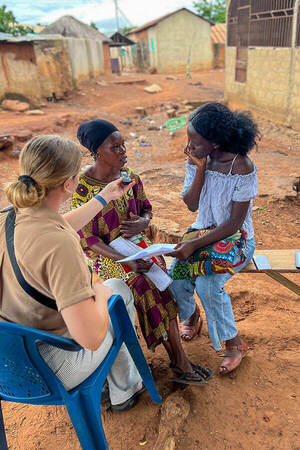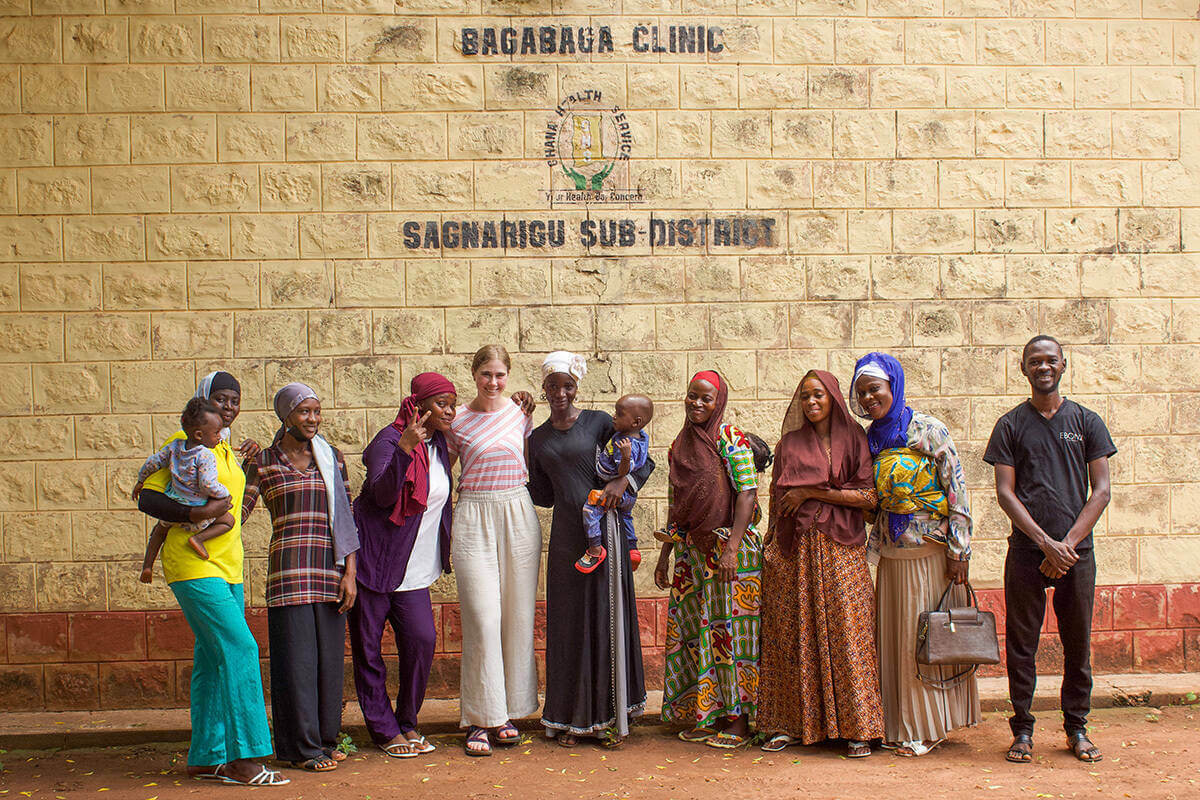Notre Dame student researcher identifies a mix of factors behind decline in exclusive breastfeeding in Ghana
Studies have shown that breastfeeding reduces the risk of asthma, obesity, and type 1 diabetes. It can also reduce the risk of Sudden Infant Death Syndrome by up to 64% and overall infant death risks by as much as 40%. So it is good news that, globally, exclusive breastfeeding is on the rise, having increased from 38% to 48% over the last decade.
However, during the same period, Ghana saw a significant decline in breastfeeding, from 63% to 43%, and the trend has researchers at the University of Notre Dame concerned.
“It’s a puzzle that I wanted to work towards piecing together,” says Sarah Frick.

with mothers for capstone research in Ghana.
A student in the Master of Science in Global Health (MSGH) program at the University of Notre Dame, Frick worked with her advisor, Yenupini Joyce Adams of the Eck Institute for Global Health, to develop a capstone research project aimed at collecting key information from Ghanaian mothers in the Sagnarigu Municipal region where breastfeeding trends have decreased the most. Dr. Adams, an assistant professor and global maternal research lead, conducts extensive research to address maternal health disparities and to improve maternal and postpartum care outcomes.
Before the MSGH program, Frick received a Bachelor of Science in Nursing from Saint Mary’s College which served as the foundation for her current research interests. “I like caring for people, so I began looking for ways to translate my skills in nursing into a global setting,” she explains.
Frick’s MSGH research project started during the summer of 2023, where she recorded group discussions and interviews with Ghanaian mothers of similar socio-economic status. Mothers were asked to share their personal experiences with breastfeeding and to offer perspectives on how breastfeeding is perceived within their community.
After the interviews were transcribed and translated into English, Frick analyzed them to identify the barriers that may have caused a reduction in exclusive breastfeeding.
“What we found was that the decrease in breastfeeding among women in the Sagnarigu Municipal of Ghana is a result of several factors: mothers feel that they are not receiving education from midwives to help make informed decisions, mothers believe they cannot or do not have enough breastmilk for their child, and pressure from their families is influencing them to provide for their babies in other ways,” says Frick.
Many of the mothers interviewed by Frick described how food instability has influenced how they care for their young children. A limited food supply can cause milk production to decrease significantly for mothers, forcing them to seek alternative options. “Sometimes, when a family does not have enough money to afford a healthy variety of foods, the mother might prioritize her family over herself,” Frick explains. “If the husband has to work each day, he needs to eat food to have energy to work. If there are other children in the household, they need to eat first. There might not be a lot of food left for the mother.”
Frick hopes that insights from her project can be shared with in-country partners, policy-makers, and midwives to develop strategies to improve maternal and postpartum health. “Midwives could play a huge role in improving breastfeeding practices,” she says. “Even though it is just one piece of a very complex puzzle, midwives are the advocates that can educate mothers and their families about the benefits of exclusive breastfeeding. They can empower not just mothers, but also their families to make informed decisions about what is best for their baby.”

Adams, who grew up in Ghana before pursuing her professional career in the United States, is confident about the impact Frick’s research will have. “Many Ghanaian mothers have been influenced by complicated factors (culture, family influence, inadequate education, among others) that have molded their views on exclusive breastfeeding,” she says. “Sarah’s work will help to guide an increased focus on providing mothers with the resources that may help them to have more success with exclusive breastfeeding.”
Frick will graduate from the MSGH program in May, 2024.
Maternal health research is ongoing at the Eck Institute for Global Health. “The Master of Science in Global Health program is inspiring students, like Sarah, to use interdisciplinary methods to understand the challenges faced by mothers and their young children,” says Dr. Bernard Nahlen, director of the Eck Institute for Global Health and professor of biological sciences. “We welcome students and faculty from across campus who are interested in maternal, newborn, and child health research to work with us to tackle these critical health challenges.”
To learn more about maternal, newborn, and child health research, please visit the Eck Institute for Global Health website. To learn more about the masters in global health program, including how to apply, please visit https://globalhealth.nd.edu/education-training/masters/.
Contact:
Christine Grashorn, Communications Specialist
Notre Dame Research / University of Notre Dame
cgrashor@nd.edu / 574.631.4856
research.nd.edu / @UNDResearch
About the Eck Institute for Global Health
The Eck Institute for Global Health (EIGH), an integral part of Notre Dame Research, builds on the University’s historical strength in infectious disease research, including vector-borne diseases, while broadening the interdisciplinary expertise into other key global health areas including maternal, newborn, and child health (MNCH); community health; mental health; nutrition and non-communicable diseases; the environment and health; health analytics and technologies; and health systems and organizations. Our team of interdisciplinary researchers and their students holistically address health disparities around the world. EIGH faculty affiliates recognize health as a fundamental human right and promote research, training, and service to advance health standards for all people, especially those in resource-poor countries who are disproportionately impacted by preventable diseases. The EIGH is training the next generation of global health researchers and leaders through undergraduate, Master of Science in Global Health, doctoral, and postdoctoral programs.
Originally published by at globalhealth.nd.edu on May 17, 2024.
Latest Research
- Biseach Symposium Strengthens Cancer Research Partnership Between Notre Dame and University of Galway…
- Notre Dame announces new research collaborations with Ukrainian Catholic UniversitySeven faculty teams of collaborators from the University of Notre Dame (South Bend, Indiana, USA) and Ukrainian Catholic University (Lviv, Ukraine) have received grants from Notre Dame Global and Notre Dame Research to pursue…
- From reaction to resolution: The future of allergy treatmentTwelve-year-old Lauren Eglite was thrilled to attend a Notre Dame football game with her father, Erik, in 2017, even though her acute peanut allergy demands constant vigilance. She was even more excited when the stadium’s brand-new video board aired an NBC Fighting…
- New Study Highlights Mother-Child Link for Anemia in The GambiaAnemia is a "silent epidemic." It affects nearly 2 billion people globally, yet many people ignore its symptoms. Typically caused by the consumption of iron-deficient foods, anemia develops gradually. Its symptoms—such as fatigue, weakness, and shortness of breath—are frequently dismissed or misattributed.
- Megan McDermott joins ND–IBM Tech Ethics Lab as new Notre Dame directorThe Notre Dame–IBM Technology Ethics Lab, a critical component of the Institute for Ethics and the Common Good (ECG) and the Notre…
- Jenkins Center for Virtue Ethics receives grant to advance love-based ethical frameworkThe University of Notre Dame has received a $10 million grant from the John Templeton Foundation to support a project titled Love and Social Transformation: Empowering Scholars and Social Innovators to Develop the Love Ethic.












